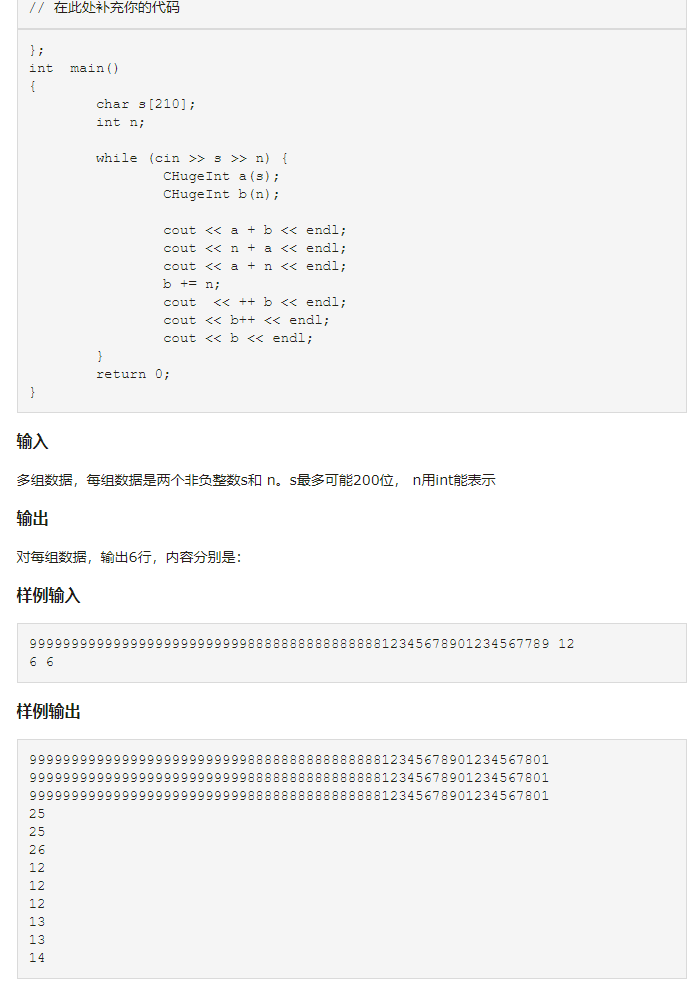
#include <iostream>#include <cstring>#include <cstdlib>#include <cstdio>using namespace std;const int MAX = 110;class CHugeInt{public: int arr[MAX]{0}; int len; CHugeInt(int n) { arr[0] = n; len = 1; } CHugeInt(const char *s) { len = strlen(s) / 9 + 1; // 一个int元素最多存9位,因为int是10位,防止溢出 const char *p = s; // 指向第一个数字 int i = len; // 把高位数存在数组的后面,如果出现高位进位,方便处理 while (i--) { for (int j = 0; j < 9 && *p != '\0'; ++j, ++p) { arr[i] = arr[i] * 10 + (*p - '0'); // 逐位将字符串读入int数组 } } } CHugeInt(const CHugeInt &hi) { memcpy(arr, hi.arr, hi.len * sizeof(int)); len = hi.len; } CHugeInt operator+(const CHugeInt &hi) // 把右边的加到左边上 { int i = 0; CHugeInt tmp(*this); int c = 0; // 低位进位 do { int sum = tmp.arr[i] + hi.arr[i] + c; c = sum / 1000000000; tmp.arr[i] = sum % 1000000000; ++i; } while ((i <= hi.len) && (i <= tmp.len)); return tmp; } void operator+=(int n) { int sum = arr[0] + n; int c = sum / 1000000000; arr[1] += c; arr[0] = sum % 1000000000; } CHugeInt &operator++() { int sum = arr[0] + 1; if (sum == 1000000000) { arr[0] = 0; arr[1] += 1; } else { arr[0] = sum; } return *this; } CHugeInt operator++(int) { CHugeInt tmp(*this); int sum = arr[0] + 1; if (sum == 1000000000) { arr[0] = 0; arr[1] += 1; } else { arr[0] = sum; } return tmp; } friend ostream &operator<<(ostream &os, const CHugeInt &hi) { int i = hi.len; while (i--) { os << hi.arr[i]; } return os; }};CHugeInt operator+(int n, const CHugeInt &hi){ CHugeInt tmp(hi); int sum = tmp.arr[0] + n; int c = sum / 1000000000; tmp.arr[1] += c; tmp.arr[0] = sum % 1000000000; return tmp;}int main(){ char s[210]; int n; while (cin >> s >> n) { CHugeInt a(s); CHugeInt b(n); cout << a + b << endl; cout << n + a << endl; cout << a + n << endl; b += n; cout << ++b << endl; cout << b++ << endl; cout << b << endl; } return 0;}
- 考察各种运算符的重载,“+”、自增运算符、流输出运算符。需要注意以下几点:
- memcpy()函数最后一个参数是拷贝的字节数,所以一般用n * sizeof()作为该参数的实参
- 前置“++”要返回自己引用,后置“++”别忘了自己加完了,返回加之前的自己的临时对象
- “+=”运算符也是需要重载的


